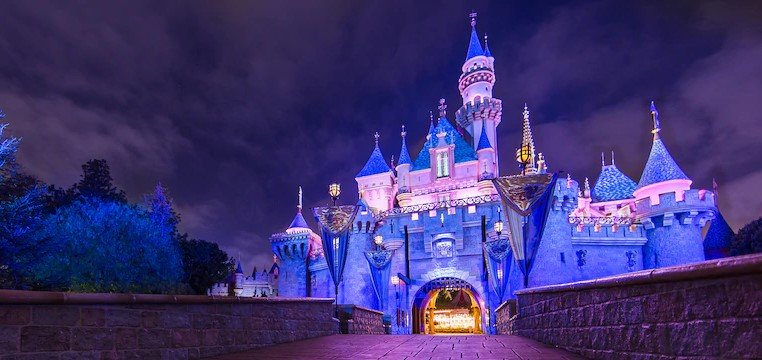3. Know your stuff, and cite it, too
Again, it sounds obvious to say that if you want to write around theme parks, you have to know your stuff. But this is an essential piece. Just really, really loving Disney World or being a huge theme park fan doesn’t mean you’ve got everything you need to create content about them. They say nothing happens in a vacuum, and that’s so important to remember when you’re writing about theme parks.
For example, if you plan to write about long waits at Disney Parks, there are many perspectives to approach it from… but none of it will really be complete if you – the author – don’t know the history of queuing at Disney Parks; not just that FastPass became Genie+, but why; how shifting leadership at the corporate level has changed operations in the parks; to have an educated idea of what might happen next… It’s not that in-depth explanations of those components need jammed into a simple update on Lightning Lane pricing, but you – as the author – need that context to inform your perspective, voice, and attitude.
For me, I pride myself on the in-depth, interconnected stories I’ve written – my Lost Legends, Declassified Disasters, Modern Marvels, and Possibilitylands. Even though each is about a particular ride, land, or park, those stories often begin years or even decades before their subject even opened.
On paper, it’s strange to start the story of the Lost Legend: Snow White’s Scary Adventures with a brief review of the history of dark rides (dating back to the 1800s) or to start the story of the Modern Marvel: The Enchanted Tiki Room with the discovery of “simple machines” in the year 200 BC, or to begin my history of queuing in the Disney Parks by researching where and when humans came up with the idea of lining up, anyway…
But understanding the ebbs and flows of the industry; the major players; historic Imagineers; the parks’ early years; the foundations of the technologies in the parks; how different CEOs have overseen different eras and priorities and plans; the random contexts that created the parks we know today… it matters! It’s not that you need to be a personal encyclopedia of theme parks in order to write about EPCOT’s newest snack, or that a simple news update requires elaboration on decades of precedent that built-up to a new fireworks show… but when you know your stuff, readers can tell.
And since no one is born knowing this stuff, remember to cite your sources. Be conspicuous about it! In school, if you didn't originate an idea or personally calculate a statistic, you're supposed to cite the source you got it from. We should push for that standard in fandom creation, too. Link to news articles, blogs, videos, and creators who did any heavy lifting for you. Pulling pieces of information from multiple sources – and then citing them – is a strength. It shows that you have a wide knowledge base gleaned from many people and resources, and linking back to them adds context for your viewer while legitimizing your perspective and making you appear like a creator who cares. Plus, it’s just good form to vocally credit those whose work you’ve used to help.
A whiny, personal example: Lots and lots of the in-depth attraction histories I’ve written have become de facto secondhand histories referenced and shared around the Internet, which I obviously think is the coolest thing to ever happen to me. Many end up becoming main sources for YouTube creators… and I feel like that makes sense! My versions of the stories are (I hope) well-told, reliably sourced, and accessible to every level of fan. So one on hand, it's great and I'm honored that my "version" of the stories serves as a foundation for remixes and retellings.
But frankly, most times, no one bothers to make that clear. I get it – by nature of being the written version of the story, I'm already at a self-appointed disadvantage. So what can I do except “grin and bear it” as I see videos that range from inspired-by-my-work to literally-using-my-words gaining tens of thousands of views (and healthy ad revenue!) while I'm lucky to get a link to my original story buried deep down in a description no one reads. Most times, it’s not cited at all.
I kind of did a little personal experiment on this. I had to search for months to assemble archival sources and a narrative flow for a story I did on Universal’s Poseidon’s Fury – an attraction whose development just isn’t very well documented. I was so proud of the finished piece – Modern Marvels: Poseidon’s Fury – and like clockwork, within a few months, a half-dozen YouTube channels had published their own Poseidon’s Fury histories. Some at least linked back to me somewhere in their sources, and some did not. It is what it is. It's the Internet. I'm not losing sleep over it. But it certainly reinforced my notion that in my stories, citations and links to source materials are always clear and conspicuous, and in turn, I hope that folks who use my stories do me the same courtesy.
If you really want to be forward-thinking, why settle for citing a fellow creator when you could turn to a model of co-creation?! (In other words... email me! I'll contribute my ideas! Be on your podcast! Etc.!)
4. Choose wisely
In the Internet of the 2020s, content is king. If you want to stay tuned into the almighty algorithm, it means feeding the furnance with #content. If it seems like “BREAKING NEWS” happens every single day, it shouldn’t be a surprise. Nearly all Disney Parks fansites rely entirely on ad-revenue gleaned from pageviews and thus generated by clicks. For better or worse, that’s the model.
Frankly, ambiguous headlines that invite clicks and “BREAKING NEWS” about every cupcake are necessary evils, practically required by creators to survive in today’s market if they hope to pay writers! So you’re unlikely to find a standard theme park fan site that doesn’t contain listicles, breaking news, and attention-grabbing headlines that need clicked into to be understood… They are just a part of the landscape in a Facebook-focused market.
Instead, your question should be whether the site deals more in “quantity” or “quality.” I've given plenty of my articles "click-me!" titles – because I want the site I'm writing for to be successful, and for my content to be read! – but I know that the quality is there, too and can rest easy at night.
Think "quality" or "quantity"? A recent job opening for a site that some say peddles in the former recently posted a full-time writing position that requires twenty-five 600+-word articles per week. That’s 100 articles every single month. Seriously, if I asked you to take a day and come up with 100 unique, short-form article headlines you could write about Disney Parks that would generate traffic, could you do it? Maybe! But could you come up with another 100 the next month? And 100 more the month after that? And without overlapping with other writers, who also have to generate 100 articles per month? Is enough actually going on in Disney Parks in any given week to create twenty five articles?
More to the point, how long could you keep that up? At that rate, in six months you'd have written more standalone articles than I've produced for Theme Park Tourist in twelve years. It’s no wonder that some sites crank out meaningless, worthless #content custom-built to cater to the lowest-common-denomonator audiences, and to trick or enrage people into clicking…
The point is, if you’re looking to get involved in the business of writing for a theme park website, you have to choose wisely. To our thinking, ally yourself with “quality,” not quantity. Know your worth, and don’t get involved in something that’s designed to be untenable. Instead, hold out for a platform that’ll embrace your perspective, strengths, and schedule…
Reach out to the writers you admire and the storytellers you enjoy listening to. Ask for their advice. Interview them. Collect their insight and their pathways to where they are. Turn to the sites you admire and check daily. Scan their website to see if they have any opportunities for you to freelance even a few articles a month for the experience, or just to compile a piece for their other writers to review. Get your name out there!
And if you don't find a site that fits the niche you want to go for, then congratulations – you've found a site that needs created from scratch. Make it yourself! Who knows... you may end up being a favorite creator for the next generation of theme park fans.







Comments
While I'm not looking to be a theme park writer, I loved this piece! A true sign of leadership is mentoring others to take your place. Thank you for passing on your wisdom!